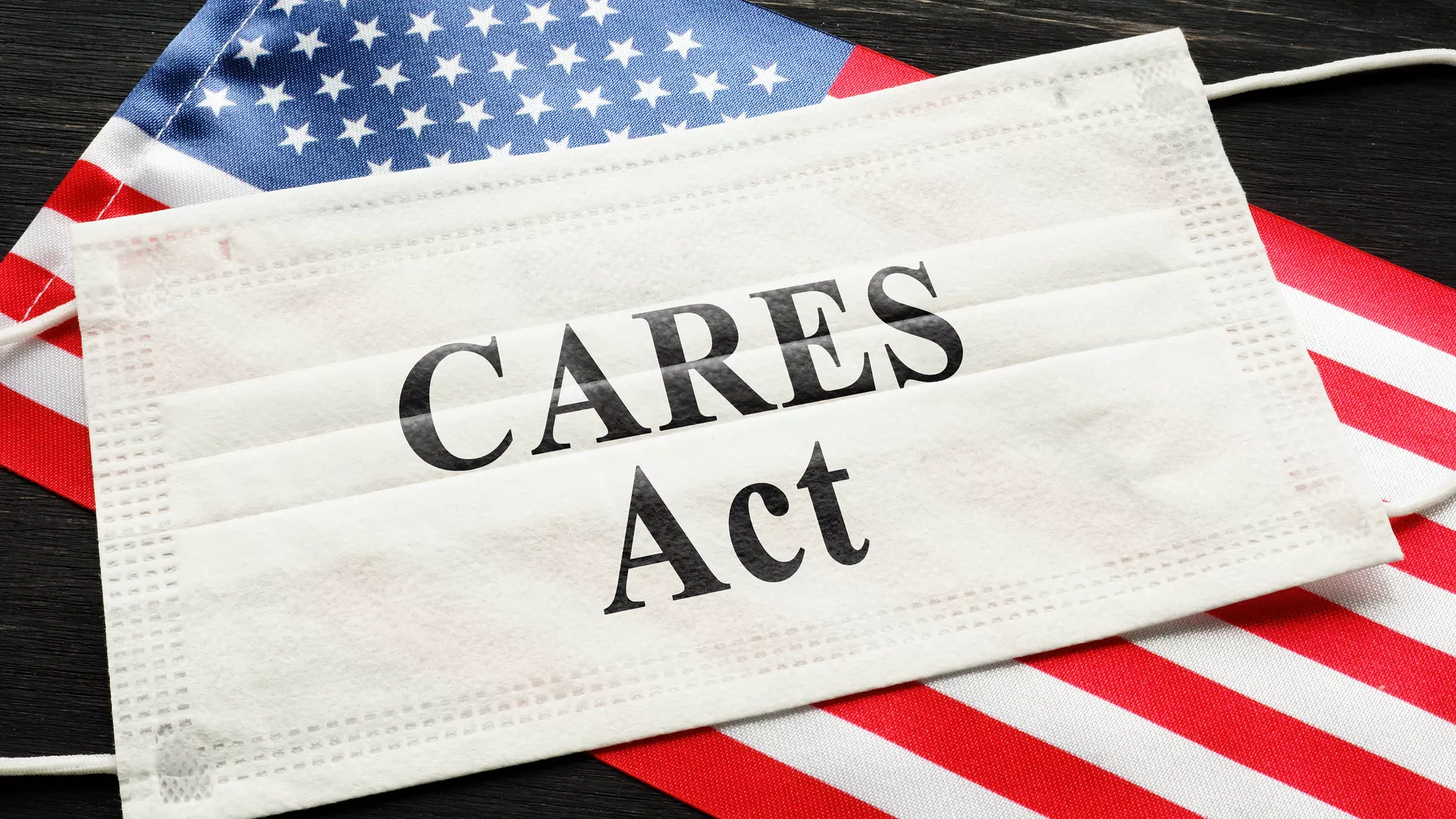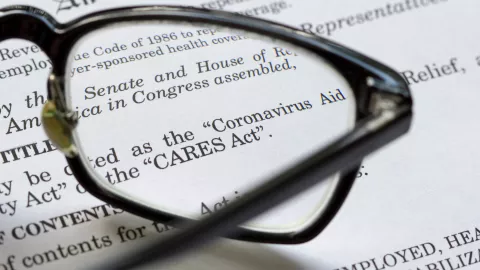

How the CARES Act can benefit healthcare providers



With the number of COVID-19 fatalities rising daily, the Coronavirus Aid, Relief, and Economic Security (CARES) Act has passed Congress and been signed into law by President Trump to provide critical aid in this uncertain time.
The $2 trillion federal stimulus package is a historic effort to mitigate the economic damage caused by quarantines, travel restrictions, and other disruptions to “business as usual.”
The CARES Act offers a lifeline for many — including healthcare providers. Amid the grim reality of medical equipment shortages and limited hospital beds, it provides the healthcare industry much-needed relief.
How can the CARES Act and related Centers for Medicare & Medicaid Services (CMS) regulations help your practice? Read on for seven ways you can benefit.

Watch this webinar presented by Greenway's Director of Regulatory Affairs for additional insights regarding the CARES Act.
- Cover payroll costs with a small business loan through the Paycheck Protection Program.
One way the CARES Act provides economic support to small businesses is through the Paycheck Protection Program (PPP). This Small Business Administration (SBA) loan program from the U.S. Department of the Treasury gives businesses an incentive to keep workers employed. It offers to forgive loans used for eligible payroll expenses, based on employers “maintaining or quickly rehiring employees and maintaining salary levels.”
Healthcare practices with fewer than 500 employees can use funds from this program to cover up to eight weeks of payroll costs and other eligible expenses such as rent, utilities, and mortgage interest. The maximum loan amount is 2.5 times the borrower’s average monthly payroll costs, or up to $10 million. PPP loans include a 0.50% fixed interest rate and deferred payments for six months.
Lenders were authorized to process PPP loan applications starting April 3, 2020. If you have not yet submitted your application, you can download a sample application form to view what’s required. When you’re ready to apply, reach out to your bank or credit union to confirm it’s a participating lender.
Although the PPP is open until June 30, 2020, interested practices are encouraged to apply as soon as possible because there is a funding cap for this program. For more information, please visit the Treasury Department’s PPP fact sheet.
Please note: The Family First Coronavirus Response Act (FFCRA) provides tax credits to small businesses with fewer than 500 employees as reimbursement for employee paid leave resulting from the COVID-19 situation. Businesses can benefit from both the FFCRA and the PPP for separate expenses. The payroll costs covered by the PPP do not include sick leave or family leave wages, which receive a tax credit through the FFCRA.
- Overcome revenue loss with an Economic Injury Disaster Loan.
Another funding option available to practices with fewer than 500 employees that qualify as small businesses is the SBA’s Economic Injury Disaster Loan (EIDL) program. With the president’s declaration of a national emergency, the EIDL program became available in all states and territories and was later allocated greater funding through the CARES Act.
Eligible practices can apply for an upfront advance payment of up to $10,000. The EIDL advance does not have to be repaid.
To apply, fill out the COVID-19 EIDL loan application on the SBA’s website. Within three days of submitting a successful application, you can expect your loan advance funds to be made available.
- Expand telehealth services to Medicare patients.
As beleaguered healthcare facilities fight to stop the spread, the need for virtual healthcare options has never been more apparent. Following the declaration of a national emergency, CMS relaxed its requirements for telehealth options for the duration of the COVID-19 emergency.
Now, the CARES Act has further increased the flexibility of Medicare telemedicine services during this crisis by allowing 80 additional services to be provided via telehealth.
Here are a few of the sweeping changes CMS has made:
- Telehealth visits can be billed at the same rate as in-person visits.
- Phone-based telehealth can be provided. Telehealth will not be limited to audio-visual options.
- Federally qualified health centers (FQHCs) and rural health clinics can serve as distant sites to provide telehealth services to patients in their homes and other locations.
“If you have to limit office hours and face-to-face interaction, look at the new telehealth requirements that have been waived and the 80 new services that are now able to have telehealth reimbursement at the full Medicare rate — this includes phone-only visits during this emergency time we are in. This can help offer some relief to your patients and your practice,” recommends Stephanie Jamison, Greenway’s Regulatory Affairs Director.
If you’re interested in offering video visits that integrate with your Greenway EHR, consider a Greenway Marketplace Partner.
“The CARES Act will protect Americans’ health and economic well-being during these uncertain times by providing broad support for families, individuals, and businesses that are facing hardship.”Alex Azar, Secretary of Health and Human Services (HHS)
- Apply for funding through the Public Health and Social Services Emergency Fund.
To prepare for the increasing surge of COVID-19 patients, the CARES Act has added $100 billion to the Public Health and Social Services Emergency Fund.
Under the management of the Secretary of Health and Human Services (HHS), this fund will reimburse eligible healthcare providers for expenses resulting from the COVID-19 pandemic.
The CARES Act defines eligible healthcare providers as “public entities, Medicare or Medicaid enrolled suppliers and providers,” in addition to for-profit and not-for-profit entities specified by the HHS Secretary. To qualify for funding, providers must take part in testing, diagnosing, or caring for possible or confirmed COVID-19 patients.
The CARES Act states that funds can be used for:
- Building or construction of temporary structures
- Leasing of properties
- Medical supplies and equipment, including personal protective equipment (PPE) and testing supplies
- Increased workforce and trainings
- Emergency operation centers
- Retrofitting facilities
- Surge capacity
In the 60 days following the CARES Act, the HHS Secretary is required to submit a report on how funds will be distributed at the state level. Until then, some details regarding these funds remain unclear. However, the legislation does indicate that applying for funds will require submitting an application with your tax ID to the HHS Secretary explaining why funding is needed.
- Receive greater protection with liability limitations for volunteer healthcare providers.
For volunteer healthcare professionals contributing their time and skills in this critical time, the CARES Act limits liability for care administered in response to the COVID-19 emergency.
Similar to state Good Samaritan laws, the CARES Act ensures that volunteer providers will not be held liable for any act or omission that occurs while providing healthcare services in their capacity as a volunteer, within the scope of their licensure, and made in good faith that the individual needed the healthcare services rendered. Exceptions to the liability limitation include gross negligence and reckless misconduct.
- Get expedited Medicare reimbursements with the Accelerated and Advance Payment Program.
During this public health emergency, CMS has expanded the Accelerated and Advance Payment Program to expedite Medicare reimbursements for providers and suppliers who meet the following criteria:
- Have billed Medicare for claims within 180 days immediately prior to the date of signature on the provider’s/supplier’s request form
- Not be in bankruptcy
- Not be under active medical review or program integrity investigation
- Not have any outstanding delinquent Medicare overpayments
Source: CMS.gov
This program allows providers to request an amount up to 100% of their Medicare payments for a previous three-month period. To submit your request, first identify your Medicare Administrative Contractor (MAC) who will process your request form. (Consult this resource to verify your servicing MAC.)
You will find the appropriate Accelerated/Advance Payment Request forms on your MAC’s website. After completing your form, you may submit it by mail or email. Within seven days of submitting a successful request, your payment will be issued.
For more details on this program, view the “Expansion of the Accelerated and Advance Payments Program for providers and suppliers during COVID-19 emergency” fact sheet from the CMS.
- Partner with local healthcare systems under new CMS regulations.
As the COVID-19 pandemic forces practices to postpone elective surgeries and procedures, specialty practices that participate in or own surgery centers can put their facilities to use — and receive payment for their services.
After the national emergency declaration, CMS allowed local ambulatory surgery centers to contract with hospitals to take on services such as non-elective surgeries and cancer treatments that are normally performed in hospitals. Although not included in the CARES Act, this change offers additional options for many practices
“CMS is allowing those ambulatory surgery centers who may have cancelled elective surgeries to contract with local healthcare systems to provide hospital services because they have a perfectly usable facility,” said Anu Nakkana, Greenway’s Corporate Counsel.
Additionally, CMS has issued a blanket waiver to the Stark Act to allow hospitals to provide incentives and support to medical staff.
“You can find out whether there are additional incentives at your local hospitals if you can take on an extra shift or volunteer your services,” Anu said. “Due to the shortage of healthcare providers, they may be offering incentives that they weren’t offering before, such as childcare.”
Benefits could include daily meals, childcare, or laundry services. Providers can check with the hospital they are associated with to learn what support the new CMS regulations extend to them.

Moving forward amid today’s uncertainty
Each day, the healthcare industry faces new challenges and often disheartening updates on COVID-19. As you navigate this unprecedented situation, we’re committed to providing the information you need to maintain your practice’s operations.
For a helpful FAQ on the CARES Act and links to additional information, view this comprehensive resource that provides a detailed breakdown of the stimulus package.
If you would like to learn more about our revenue cycle management services or EHR and practice management solutions, schedule a call with a Greenway representative. We’d be glad to walk you through the ways our digital solutions can help during this difficult time.
For more information, CLICK HERE to schedule a conversation with a Greenway representative. Or watch our 3-minute overview video HERE.




